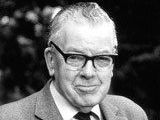F.F. Bruce: A Life (Tim Grass, 2011)

A gentle, accessible scholar
My first memory of F. F. Bruce (1910-1990) was his book, The New Testament Documents: Are They Reliable? It was Bruce’s first book, originally published in 1943, and has rightly become a classic. I read it while I was in college, and the book shaped my understanding of Holy Scripture, the faith, and the significance of doubt.
I had been raised in a church community where expressions of doubt were discouraged, and interpreted as signs of disbelief. When I had raised the question that makes up the title of Bruce’s book, it was assumed there either was hidden sin in my life, or that my devotional practices were lacking, or both. F. F. Bruce in The New Testament Documents, in contrast, exhibited a fearless willingness to submit faith and the Bible to thoughtful, careful, patient scholarship, making the results of that study accessible to ordinary believers. Reading Bruce’s words was a bracing experience, an important milestone in my quest for reality, so it was a shock to discover that he was part of the same church community as I was, the Plymouth Brethren.
F. F. Bruce: A Life by Tim Grass is a biography, written by someone who recognizes Bruce’s significance as an evangelical biblical scholar and mentor. A prolific writer and teacher, Bruce taught at several universities in Great Britain before becoming Rylands Professor of Biblical Criticism & Exegesis at the University of Manchester. As he began his academic career, N. T. Wright says, “there were virtually no other scholars of his eminence who were prepared to stand up and be counted as believers in the truth of the New Testament and the Jesus of whom it speaks.” Grass also recognizes Bruce’s significance as a kind and admirable man, someone who took Christ seriously and so understood his call to godliness as crucial to what it means to be a Christian who flourishes as a human being.
It is this mixture of uncompromising scholarship and persistent gentleness that makes F. F. Bruce: A Life worth reading even for those previously unacquainted with the man. As you read you will see demonstrated a number of things worth careful reflection by all of us.
First, there is Bruce’s solid and careful thinking. This was a man who believed the Bible passionately and who was yet not merely unafraid to think, he was eager to do so. His notion of Christ’s Lordship included the intellect, the life of the mind and the history of ideas. He did not hesitate to take challenges seriously, was unafraid to disagree, and delighted in the truth regardless of who proclaimed it.
The story of Bruce’s quiet and unmoving commitment to the Bible is both remarkable and worthy of imitation. He seemed unhurried in his attempt to address difficulties, mistaken ideas, and misguided intellectual fads, but did not waver in unbelief as the process of discernment progressed. He demonstrated the intellectual freedom that a commitment to Christ’s Lordship confers, and that many today—both believers and unbelievers—consider impossible.
And finally, F. F. Bruce: A Life is a study in compassionate faithfulness even in the face of disagreement. Bruce disagreed with many of the Plymouth Brethren’s unique doctrines, but remained in fellowship with them. Over many years Bruce emphasized agreement, showed gratefulness for the movement’s admirable distinctives, and found civil, loving, inoffensive but clear ways to express his disagreements. The part of the Plymouth Brethren in which I was raised dismissed Bruce for his “liberalism,” but the part that was less anti-intellectual embraced him. He befriended liberal scholars, learned from them, and defended them when they were dismissed as unworthy of attention. The Christian world is far richer for the commentaries, books, and articles that flowed from his pen, and when I recently culled my library I was certain to keep every title authored by F. F. Bruce.
Few of us may be scholars or academics, but these are qualities that should characterize us all. Seeing them demonstrated in someone is worth the time it takes to read Grass’ excellent biography.
Source
F. F. Bruce: A Life by Tim Grass (Grand Rapids, MI: Eerdmans; 2011) 227 pages + chronology + bibliography + index.Source: N. T. Wright in Forward to The New Testament Documents: Are They Reliable? (1943, 1981) p. ix.

